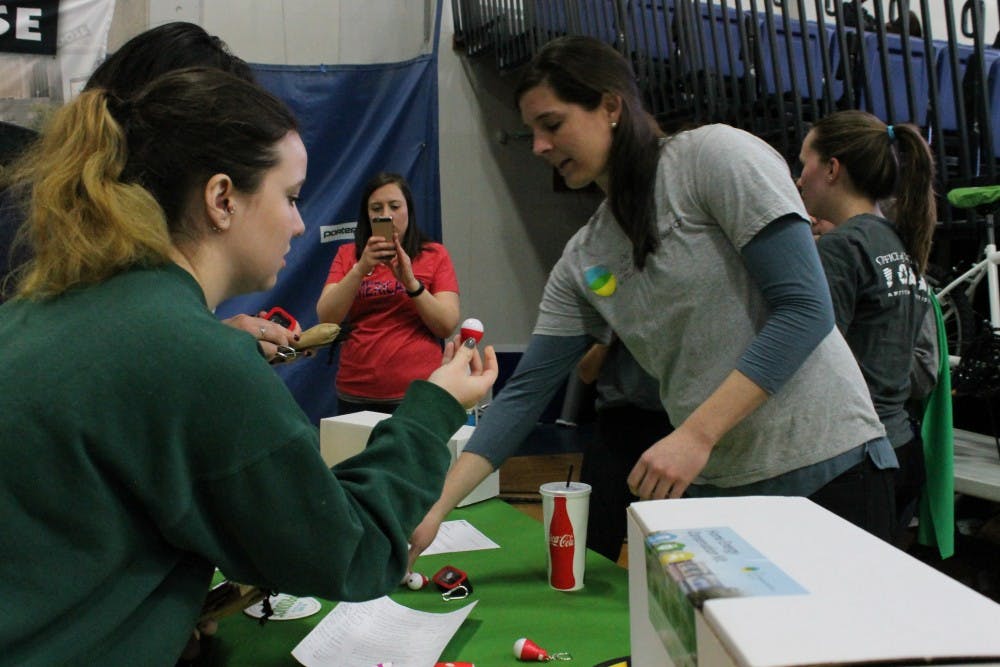Climate change is a big and looming issue, but it doesn’t have to be so intimidating. The (Com)Post is The Eagle’s new sustainability series that breaks down topics in eco-friendly living in a fresh, actionable and fun way. Check out our first installment of a staff writer making a zero waste meal.
Even before School of Public Affairs freshman Conner Shipp and School of Communication sophomore Sarah Graver became AU’s Zero Waste Club’s newest co-presidents, the climate-conscious group was already making waves on campus.
With several successful projects throughout the year, the leaders bounce ideas off of each other to generate new ways for AU students to lower the amount of waste they produce.
“The co-presidents before us, Grace Pugh and Caroline Johnson, were really great,” Shipp said. “[They] worked closely with Tyler Orton, who’s in charge of the composting program on campus.”
Project Move-In is one of the club’s first events of the school year that lets students buy donated furniture, hangers and other small dorm essentials in late August. At the end of the spring semester, Project Move-Out allows students to donate items by placing them in the designated bins the club places at the end of each floor in the residence halls, which they sell on the quad in the fall.
The two projects are perfect examples of the Zero Waste Club’s mission in action, Shipp said.
“Our club’s purpose is to help facilitate and give students the knowledge to reduce their waste in any way,” Shipp said.
Not only are the events some of the club’s biggest fundraisers, they also help the AU community move toward a more sustainable move-in process, Shipp said.
“It’s a lot of cumbersome stuff you wouldn’t want to pack,” Shipp said. “You’re not generating the waste from going out and purchasing those items just to throw them away at the end of the year.”
The club works closely with the University, which gives housing extensions to volunteers who manage the program. It also uses AU’s resources and storage space to make the projects run as smoothly as possible.
Club meetings often include an educational component to go along with activities, such as make-your-own sustainable cleaning products and a clothing swap, paired with presentations on waste and how to adopt a sustainable lifestyle.
With growing anxiety over climate change and the negative implications of waste on the environment, Shipp said that it’s up to this generation to make massive lifestyle changes. Still, club members recognize that achieving a zero waste lifestyle is easier said than done.
“I think that is a really high expectation for just your average college student,” Graver said. “My philosophy with it is as long as people are aware of the waste that they’re creating and … think about where it goes, then that will, in turn, lower what people use.”
The club created the guides on how to recycle and compost on the side of AU’s landfill, compost and recycling bins, and regularly hands out magnets with the same cheat sheets.
“People are looking for one big thing they can do that will change their waste output, and really it’s the little things,” Shipp said.
Small changes such as bringing your own coffee cup, buying secondhand sustainable products and utilizing AU’s many water fountains to fill reusable water bottles are steps in the right direction, Graver said.
Other steps toward a more sustainable life include their recent work with composting and food waste in the Terrace Dining Room, one of the club’s newest contributions to combat a larger societal problem.
“One of the biggest things we’re doing right now is the Food Recovery Network,” Shipp said. “That’s basically collecting food that goes unserved through AU Dining Services and distributing it to people across the D.C. community.”
The group currently meets every other Wednesday at 8:30 p.m. in MGC 247. For future projects, the members currently have an on-campus thrift store in the works, which would allow students to reduce their carbon footprint via second-hand shopping.
“There’s a few spaces that we’ve been eyeing for a bit,” Shipp said. “We’ve been in communication with campus leaders as far as getting that implemented.”
According to Shipp and Graver, living sustainably is more a responsibility than a choice. The leaders encourage AU students to get educated on how to reduce their carbon footprint and live more consciously of waste.
“If you have the ability to, why not stop it?” Shipp said. “Why not educate others?”





